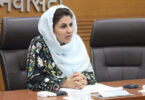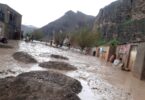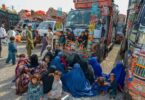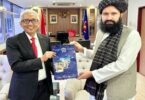KABUL (Agencies): Pazhwak Stanakzai learned English by watching American movies. From his home in Afghanistan, he’d absorb lines from his favorites — like “Inception” and “Batman: The Dark Knight”— eventually picking up enough to have conversations with himself.
At the time, Stanakzai, now 19, had no idea how valuable those lessons would be. His life in Kabul was mostly good — his father was a civil engineer, his mother a clothes maker — and his family lived in a big house near Spin Kalay Square in the city’s Fifth District. His foray into US cinema was largely for fun, he said. While he was born roughly a year after the US invasion and war had been a constant part of his life, American troops mostly stayed out in the mountains. His childhood was warm and idyllic, he recalls.
Then things changed. Stanakzai — who goes by Hamed — shared the memories and others by phone from Puyallup’s South Hill. It’s here, on a quiet road not far from Rogers High School, where he now lives with his parents, five siblings and two cousins. Since the hasty and chaotic US withdrawal from Afghanistan in August, Stanakzai is one of hundreds of Afghan refugees who have come to call this area home.
According to Lutheran Community Services Northwest president and CEO David Duea, that’s partly because the nonprofit’s Tacoma office has become a local “hub” for Afghan resettlement efforts. Between October and early January, nearly 300 refugees were resettled through the office, most of them finding a home in south King County or north Pierce County, Duea told The News Tribune. That’s more than Lutheran Community Services Northwest’s Vancouver and Portland offices combined, according to a spokesperson for the nonprofit, and things aren’t expected to slow down until later this month.
For families like Stanakzai’s, the welcome they’ve received in the South Sound is an example of all that’s good and decent in an often complicated world. For the rest of us, it’s a reminder of who we can be — when we’re at our very best. “I can’t express it in words. I would never have thought that we would get this much help,” Stanakzai said. “The community has accepted us like one of their own. … The kindness is overwhelming. It warms my heart.”
Speaking with Stanakzai, it can be difficult to fully appreciate where he was just six months ago, at least until he vividly described the morning that news of the Taliban’s imminent arrival in Kabul made its way to the family clothing shop. He recalls going home to hide with his loved ones, including his father, who had worked side by side with American forces building schools and runways. He remembers the late-night call they received, telling them where to catch the plane that would take them out of the country. He remembers his first real steps on US soil at Fort McCoy in Wisconsin, an Army installation of 60,000 acres roughly three hours west of Milwaukee. He also remembers Dec. 24 — Christmas Eve — when his family was welcomed into a roughly 1000-square-foot home recently purchased by Mary Minsk and her husband, expressly for the purpose of housing refugees just like them.
Stanakzai still misses Afghanistan, he said, but in the same breath acknowledges how fortunate his family was to escape. “If we stayed there, my father — god forbid — would have died. We would have starved to death,” Stanakzai said. “I have a huge opportunity which a lot of people are not presented with. I have an opportunity to educate myself here. I have an opportunity to work here. I have an opportunity to make a life for myself.”
Providing a chance like this, to someone, was exactly what Minsk and her husband had in mind when they decided to purchase the home where Stanakzai and his family now live, not far from the one where they raised children of their own on South Hill. Minsk largely credited Puyallup South Hill Rotary — where she’s been an active member for the last four years — for inspiring the decision. The Rotary was drawn to the Afghan refugee resettlement effort and the work of Lutheran Community Services Northwest — which had been working since the days immediately after the US withdrawal to find homes for special immigrant visa holders and other refugees from the country, she said. Former Rotary president Suzanne Johnston said the local club has helped to furnish the home and helped with tasks like getting Stanakzai’s younger brothers and sisters enrolled in local schools. It’s work they plan to continue, Johnston said.
For Lutheran Community Services Northwest, one of the biggest challenges, Duea said, is identifying affordable housing. The agency has funding to support arriving families for the first 90 days, and the time line can be tight. Typically, new refugees are housed with friends or relatives already living in the area. With the onslaught of arriving families, Duea said Lutheran Community Services Northwest recently has been relying on host families like Minsk’s as well. It’s not something that has been done on a large scale since the fall of Saigon and the Cambodian genocide brought thousands of refugees to the area in the late 1970s and early 1980s, Duea said.
Minsk, who works in health care, said the experience of welcoming Stanakzai and his family has been everything she’d hoped. One of the most rewarding aspects, she said, has been learning about Afghan history and culture, often while running errands with the family or making sure they have everything they need — like shoes and warm clothing. “It’s a small way we can help,” Minsk said, politely deflecting any personal recognition her family might receive for its efforts. “It’s become such a small world, and it’s important for us all to help each other.”
Duea said what Minsk and Puyallup South Hill Rotary have done — while exceptional — is just one of many examples of South Sound residents rising to the occasion and doing what’s right for families making the difficult transition to life in the United States. “I think there’s a moral imperative,” Duea said. “The response has really been overwhelmingly positive.”






